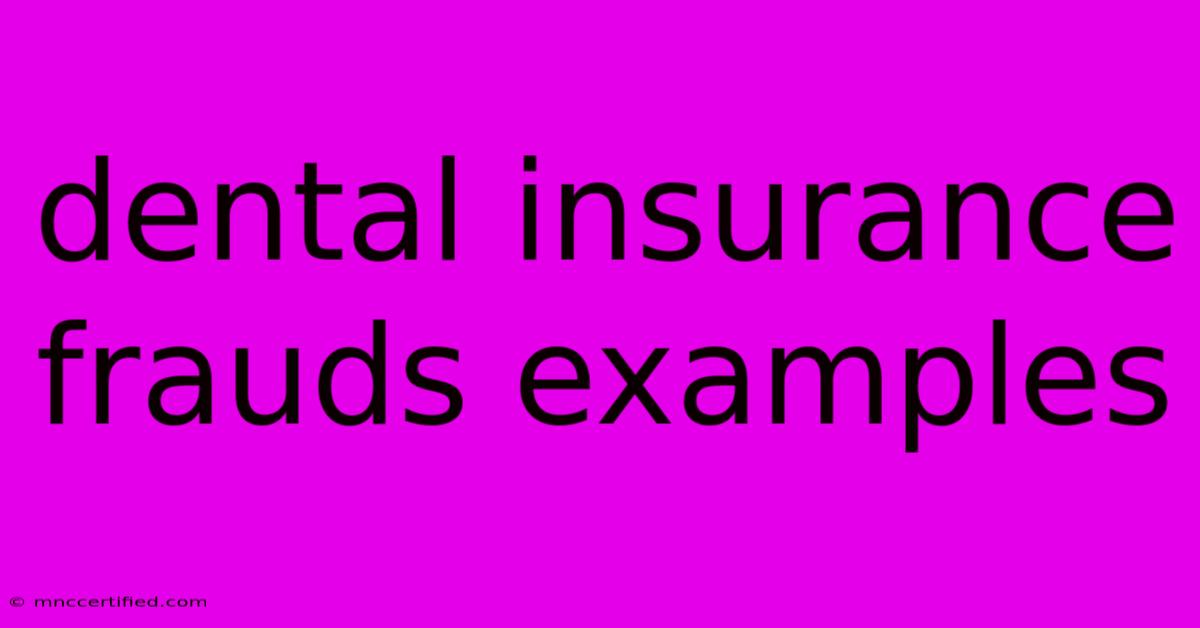Dental Insurance Frauds Examples

Table of Contents
Dental Insurance Fraud: Examples and How to Avoid It
Dental insurance is designed to make necessary dental care more affordable, but unfortunately, it's also a target for fraud. Understanding common examples of dental insurance fraud is crucial for both patients and providers to protect themselves and maintain the integrity of the system. This article will explore several scenarios, emphasizing the importance of ethical practices and consumer awareness.
Common Examples of Dental Insurance Fraud
Dental insurance fraud can take many forms, impacting both patients and insurance companies significantly. Here are some prevalent examples:
1. Upcoding:
This involves billing for a more expensive procedure than the one actually performed. For example, a dentist might bill for a crown (a significantly more expensive procedure) when only a filling was actually placed. Upcoding is a serious offense, leading to inflated claims and increased costs for insurers and ultimately, consumers.
2. Unbundling:
This fraudulent practice involves breaking down a single procedure into multiple smaller, separately billable components. For instance, a simple extraction might be billed as separate procedures for the extraction itself, anesthesia, and post-operative care, even though these are typically bundled into one fee. This artificially inflates the overall cost.
3. Phantom Billing:
This is one of the most egregious forms of fraud, where services are billed that were never actually provided. The dentist might bill for cleanings, x-rays, or other procedures that the patient never received. This is often difficult to detect without meticulous record-keeping.
4. False Claims:
Submitting false information on claims forms is another common form of fraud. This could involve misrepresenting the diagnosis, the procedures performed, or the patient's eligibility for coverage. For example, claiming a patient needed a complex root canal when a simpler filling would have sufficed.
5. Overbilling:
Charging excessive fees for procedures that were legitimately performed is also considered fraud. While prices may vary slightly between dentists, exorbitant charges compared to regional averages warrant suspicion. This often targets patients with limited dental knowledge or those relying heavily on insurance coverage.
Patient Responsibility: Recognizing and Avoiding Fraud
Patients play a crucial role in preventing dental insurance fraud. Here are some steps you can take:
- Review your Explanation of Benefits (EOB) carefully: Compare the services listed on your EOB with the treatment you actually received. Any discrepancies should be immediately reported to your insurance provider.
- Ask questions: Don't hesitate to ask your dentist about the procedures being recommended, the costs involved, and the reason for each service. Transparency is key to a healthy dentist-patient relationship.
- Obtain a detailed treatment plan: Request a written treatment plan that clearly outlines all planned procedures, costs, and insurance coverage details. This serves as a reference point for comparison against your billing statements.
- Keep accurate records: Maintain copies of your dental bills, insurance EOBs, and treatment plans. These records will be invaluable if you need to investigate a potential claim.
- Report suspicious activity: If you suspect dental insurance fraud, report it immediately to your insurance company and, if necessary, the relevant authorities.
The Impact of Dental Insurance Fraud
Dental insurance fraud affects everyone. It drives up premiums for honest patients, reduces the availability of affordable dental care, and undermines the public's trust in the dental profession. Ethical practices are essential to maintaining a fair and equitable system.
Conclusion: Protecting Yourself and the System
By understanding the common methods of dental insurance fraud and taking proactive steps to protect yourself, you can contribute to a more honest and transparent dental care system. Remember, vigilance and informed decision-making are key to preventing fraud and ensuring you receive the quality dental care you deserve.

Thank you for visiting our website wich cover about Dental Insurance Frauds Examples. We hope the information provided has been useful to you. Feel free to contact us if you have any questions or need further assistance. See you next time and dont miss to bookmark.
Featured Posts
-
Health Insurance San Luis Obispo
Nov 22, 2024
-
K12 Student Insurance Miami Dade
Nov 22, 2024
-
Oura Ring Review Mindful Living
Nov 22, 2024
-
Storm Bert Ni Weekend Weather Warnings
Nov 22, 2024
-
Kingsway Amigo Insurance Company
Nov 22, 2024